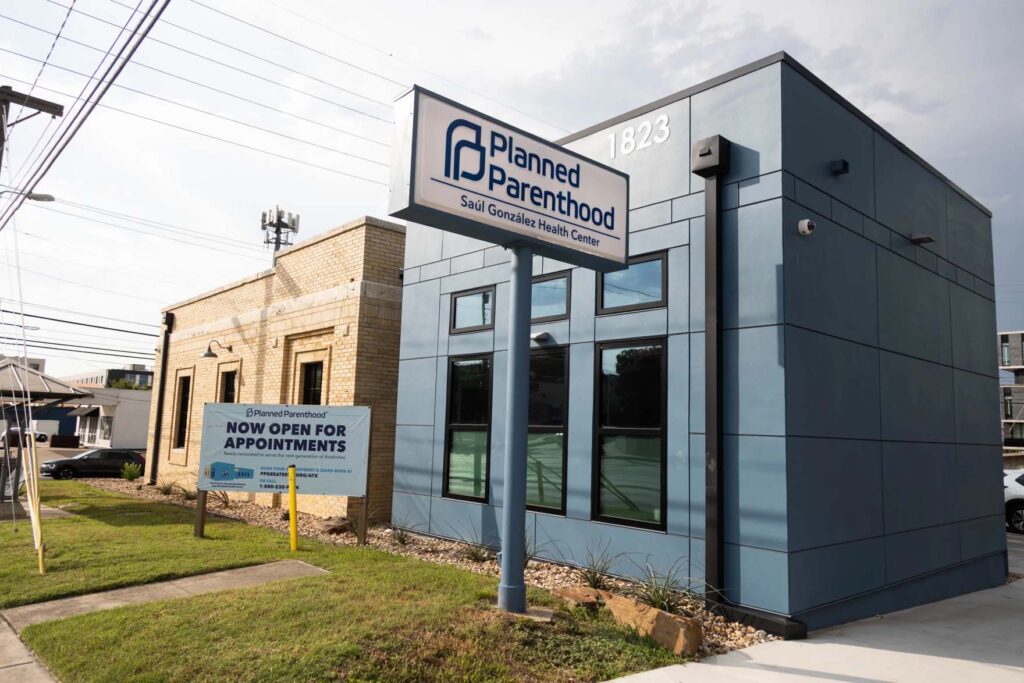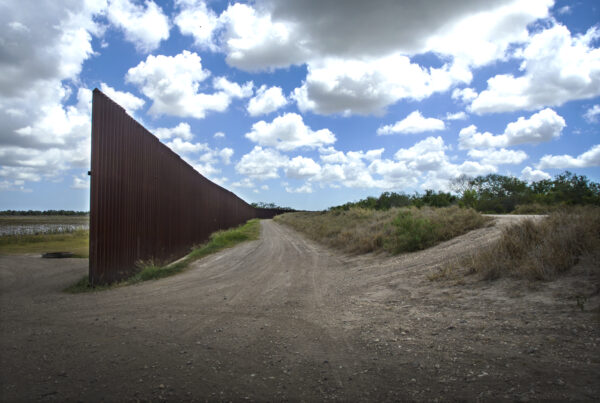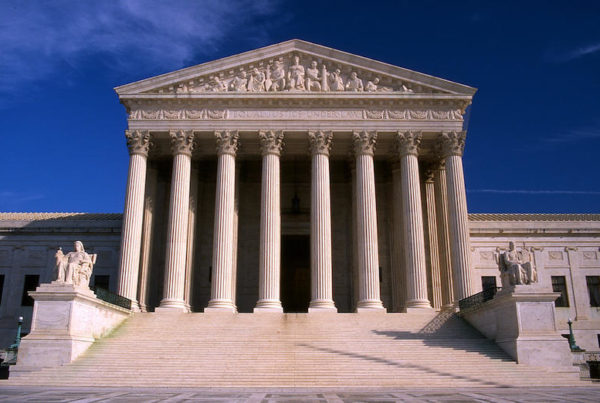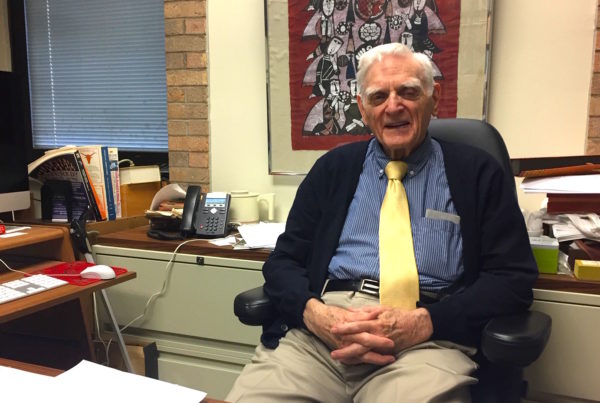From KUT:
Shardae Russell has been helping women in Texas navigate abortion since she was 12 years old. She started as a volunteer at the Fort Worth location of Whole Woman’s Health, a national organization that provides abortions, where her mother worked.
“I just remember there being a lot of protesters, just screaming at patients and stuff like that. I definitely think that got me into it, because I knew there were so many things that were against people,” Russell, now 24, said. “I definitely wanted to be one of those people that helped.”
After college, Russell began formally working at the clinic. But a year later, the U.S. Supreme Court released its Dobbs v. Jackson Women’s Health Organization decision on June 24, 2022, overturning the right to abortion. Nearly all abortions became illegal in Texas, closing the six-week window for legal abortions that had remained since the state passed Senate Bill 8 in September 2021.
Now, a year after Dobbs, Russell is still helping Texas women get abortions. She’s just traveling outside of Texas to do it.
In June 2022, Whole Woman’s Health announced it would move its Texas operations to New Mexico. The organization’s new Albuquerque clinic opened in March and offers services every Thursday through Sunday. Russell, now a regional community outreach manager for Whole Woman’s Health, frequently flies from Dallas to Albuquerque to help staff the clinic on the weekends.
“This last month or so I have been coming back almost every weekend. I go home Saturday night, and then I come back Wednesday night,” she said.
During these trips, Russell says she often finds herself on the same flights as patients on their way to appointments at the clinic, as well as other staffers, including physicians, nurses, medical assistants and counselors.
“It’s ironic on some level that they all … have to board a plane in order to take care of people who are literally from their own town,” said Amy Hagstrom Miller, founder and CEO of Whole Woman’s Health.
Getting there
Flying or driving out of state for an abortion can be expensive and inconvenient, especially for residents of Texas’ vast interior. Austinites, for instance, face an eight-hour drive to Wichita, Kansas, the nearest city with a clinic that offers legal abortions. Alternatively, they can drive 11 hours to Albuquerque or 13 to Pueblo, the city in Colorado with an abortion clinic closest to Texas.
But data from clinics in these three cities indicate that many Texans are making the trip. Nearly all of the appointments made at Whole Woman’s Health in Albuquerque have been made by Texans, according to Miller. She credits this trend partly to the organization’s outreach to Texas cities where it used to have clinics, such as Austin and Fort Worth, but also to the sheer size of Texas’ population.
CARE Colorado in Pueblo has also seen a flood of Texans. The clinic opened in December 2022. At the time, owner Leroy Carhart IV anticipated that some Texans would seek care at the clinic but that the lion’s share of patients would be Coloradans. However, Texans have accounted for 47% of CARE Colorado’s patients so far, compared to the 31% of patients from Colorado.
“We did expect there to be a lot of traveling patients, just because of the Dobbsdecision, [but] we didn’t really expect it to be close to 50%,” Carhart said.
Carhart said Texans most often arrive by car, driving in from cities and towns all over the state, whether making the 13-hour trek from Austin or a five-hour trip from Amarillo.
These long trips come with additional logistical issues. In many cases, abortion funds, such as the Austin-based Lilith Fund and Jane’s Due Process, help to offset costs and to find out-of-state appointments. But the hurdles of getting time off work and arranging child care can still be prohibitive, abortion advocates say.
Miller said a woman from Houston made and canceled three separate appointments at Whole Woman’s Health in Albuquerque, although the organization’s in-house abortion fund had raised money to pay for her travel and procedure.
“One time her baby was sick, and she couldn’t leave. The other time, the car that she was going to drive broke down,” Miller said. “Finally, she just called us and she said, ‘I’m just going to have this baby. It’s easier.’”
‘Missing from the narrative’
Abortion data indicates many Texans may be making the same calculation.
In 2020, more than 55,000 abortions were performed in the state of Texas, according to the Texas Department of State Health Services. Since abortion was outlawed, Texans have flooded the rosters of clinics in surrounding states, forming a diaspora of care that crosses Colorado, New Mexico, Kansas and beyond.
But increased abortion activity in these states still does not account for the previous number of abortion-seekers in Texas. A June study from the Society of Family Planningshows clinics in states near Texas completed thousands more abortions in the months since Dobbs than they normally would have; Colorado had about 4,500 more, New Mexico had 2,990 more and Kansas had 3,320 more.
Miller said she wonders about the thousands of people not accounted for by this data and what impact their inability to receive an abortion will have on them.
“People in Texas are being forced to carry a pregnancy against their will, beyond their ability, a pregnancy they didn’t feel ready for emotionally, financially, physically,” Miller said. “And their stories are missing from this narrative. What’s happening to their families? What’s happening to their health?”
Pushed farther afield
Those who are able to travel rely on the preservation and protection of abortion rights in other states.
Carhart said he believes Texans are attracted to Colorado’s legal protections for abortion seekers. This spring, the Colorado Legislature passed a “shield law” protecting people who travel to Colorado for abortions from legal action initiated in other states. Additionally, Colorado’s longstanding “bubble law” mandates that protesters leave 8 feet of distance between them and anyone entering a health care facility, including an abortion clinic.
Kansas, on the other hand, is still fighting to maintain its own abortion rights while serving the needs of an entire region. Although Kansas voters soundly rejected a state amendment that would have restricted access to abortion last year, the state Legislature attempted to pass multiple laws related to abortion during its 2023 session, including one that Planned Parenthood is challenging in court.
“When one provider in one part of the country is unable to offer services, or is affected, that echoes throughout the region, because there are just far too few providers,” said Emily Wales, president and CEO of Planned Parenthood Great Plains, which serves Kansas, Missouri, Arkansas and Oklahoma.
When Texas passed SB 8 in September 2021, Planned Parenthood clinics in Oklahoma saw a flood of patients from Texas “almost overnight,” Wales said. Then, when the Dobbs decision resulted in near-total abortion bans in Texas and Oklahoma, abortion seekers from both states sought appointments in Kansas. Now, Wales says around half of all patients at Planned Parenthood clinics in Kansas are Texans.
This heightened demand often surpasses the Wichita clinic’s capacity, and Texas patients are referred to the more distant Kansas City and Overland Park locations. Even still, Wales says Planned Parenthood Great Plains is currently only able to accommodate 15-20% of the people who call asking for appointments.
“There is no question that there are more people who need care right now than we are able to serve,” Wales said.
The view from home
While many clinics that once offered abortion in Texas have shuttered, some still stand, offering other reproductive and sexual health services. Planned Parenthood, for instance, has expanded clinic hours at its Austin locations to offer more appointments during evenings and weekends.
According to Sarah Wheat, a spokesperson for Planned Parenthood of Greater Texas, birth control services, STI screening and women’s wellness exams have always been the organization’s bread and butter, even when abortion services were still available. In fact, Planned Parenthood’s Austin clinics have seen an uptick in patients since adding more hours last year. From January to June 2023, 5,781 patients and counting have visited a clinic, compared to 5,010 during the same period in 2022.

Planned Parenthood locations in Austin offer birth control services and women’s wellness exams.
Patricia Lim / KUT
Still, the organization considers abortion to be an important part of the spectrum of sexual and reproductive health care. And while abortions aren’t available in Texas, Planned Parenthood still lets people know that abortion is an option elsewhere.
“Ultimately, we want to empower our patients to make the decisions that are right for them, and that includes accessing an abortion if that’s that patient’s choice,” Wheat said. “We’re going to make sure patients know it is an incredibly common, safe choice, and we’re going to point them in the direction of the resources that are out there to help them.”
Although Whole Woman’s Health no longer operates locations in Texas, the former clinics’ phones are still active — and they ring with calls from Texans who want abortions. Miller says some don’t know they can’t get one in Texas anymore. Others do and are hoping for advice about where to turn.
Russell says she finds it difficult to tell women that they can’t get an abortion in Texas, but she feels it’s important to remain in her home state to serve as a resource.
“Some people look it up on the internet, and they try to do something crazy, like at-home abortions and things that can just turn out bad,” she said. “So, I’m definitely happy that I’m that person that they can talk to, and I can send them to the right places and help them with funding [and] support.”
One of the requirements of doing Russell’s job is discretion. On flights back to Dallas from Albuquerque, she tries not to bring attention to patients she notices from the clinic. Once, though, a patient stopped Russell as she walked to her seat on the plane and handed her a gift from the airport gift shop.
“I was so, so happy,” Russell said. “The gift is not really what matters. But the fact that she was open enough to come talk to me and say thank you … made me validate why I’m doing this.”














